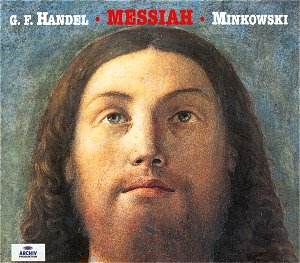According to the liner notes with this recording, Marc Minkowski
was involved in a film by William Klein about Messiah. This was
filmed in a wide variety of places around the world. He says that this
recording is the "soundtrack" to the film, adding, "…it’s
not like the Messiah we’d prepared in concert or the one we would
have recorded in a studio." I must admit, since it was recorded
in a studio, I remain a bit perplexed. In any case, this is the first
recording of Messiah by a conductor who has certainly left his
mark on the Handelian discography, with his Ariodante, among others.
The sound of this recording is quite a conundrum. The
instruments, especially when playing purely instrumental passages, such
as the opening Sinfony, sound flat and shallow. Yet the voices, both
the soloist and choir, are vibrant. The 37-member choir is rich and
powerful without being overpowering, and is certainly one of the highlights
of this recording. It is well-miked, and is spread across the soundscape,
providing a fine presence. But the overall dynamics are annoying. At
times, the instruments play softly, and, when the chorus sings, it is
very loud. It is hard to adjust the volume to listen to the entire work
at one set volume.
One may wonder about the number of soloists used for
this recording. In spite of Magdalena Kozena’s fine voice, was it really
necessary to include her for just one aria in this recording? Is this
merely for marketing reasons, to put her name on the cover of the CD?
The same can be said for the use of two sopranos, or of both a contralto
and countertenor, especially since Kozena, a mezzo-soprano, sings an
alto aria. The same applies to Charlotte Hellekant, who sings just one
aria, Are you despised, the longest, and one of the finest arias
in Messiah. Unfortunately, she brings nothing to this aria, and
her overuse of vibrato greatly mars her otherwise attractive, dark voice.
It is nearly impossible to understand what she is singing, because of
her constant chirping vibrato.
Soprano Nicole Heaston certainly stands out as having
one of the finest voices on this recording. Unadorned by excessive vibrato,
she shines in the duet with countertenor Brian Asawa, He shall feed
his flock. Her voice is pure and rich with emotion, and her subtle
use of vibrato should have been a model for some of the other singers
in this recording - she uses it as an ornament, as it should be used.
Asawa is also excellent, both in this duet and in his other appearances.
Tenor John Mark Ainsley is brilliant, with a fine voice
and excellent tone, both in the recitatives and arias. Ainsley and Heaston
are the finest soloists on this recording. The several arias taken by
Ainsley in Part 2 of the oratorio are outstanding.
This recording of Messiah features a strong
and sensitive choir, but there are too many weak points for it to deserve
a top recommendation. The strangeness of using certain soloists for
just one aria, as what is presumably a marketing hook, the unconvincing
sound of the orchestra, and the fact that some of the soloists are not
up to par detracts from its strong points. But the choir is good, and
the final chorus is bubbles over with energy.
Kirk McElhearn
